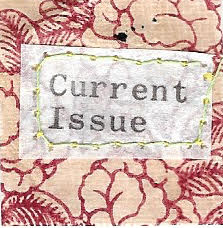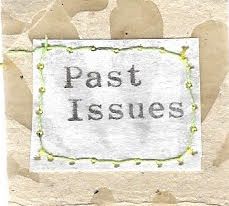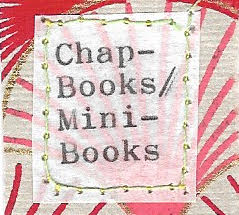Lisa Eve Cheby
Weeding in the Patriarchy
To kill the weed, you have to dig up the root
otherwise it re-sprouts in all your newsfeeds
as male friends emboldened to admit that though Hefner
had a “dark side,” they loved “St. Hugh products”
for the stories, of course.
___
As dedicated as librarians are to collecting knowledge and promoting
books, we must be avid and aggressive weeders. We are all constrained by finite
space and time in curating our library collections. Archivists are specialized
librarians tasked with preserving specific types of material in particular disciplines,
but even they must discern what is worth preserving and what does not need to be
saved. Though, even if space were infinite, not every book is worth keeping. Do we
need to preserve considerate texts on sex education beholden to gender stereotypes
from decades ago or high school history books that portray colonizers as saviors
and indigenous cultures as being in need of civilizing? Still, the public balks at the
idea of throwing out books, any books. They build little free libraries to avoid
throwing out even the most tattered and offensive books. Librarians pack weeded
books off to warehouses to be disposed of discreetly. We do this to make our
libraries stronger. We do this because even those who do not buy their own books
deserve to read books that are whole, current, and relevant.
___
The women’s movement wanted
1) women to have the opportunity to do the things that men do
and to embody masculine traits and interests;1
___
Daniel and Allie, my two closest librarian colleagues, and I celebrate the start of
each school year with a dinner at Pace, an Italian restaurant snuggled in Laurel
Canyon.
Over appetizers, we discuss our most recent relationship failures.
Daniel (male, thirty-something friend):
I have trouble showing compassion and patience in relationships, so the smallest
wrong will set me off.
Allie (female, forty-something, in-process-of-divorce friend):
It’s hard to give up control, to be vulnerable.
___
Early on in the emerging field of librarianship women became
the majority because they were willing to work for less.2 Thus, the values and methods
of librarianship espouse qualities that are commonly attributed to being feminine.
Weeding is a good example of this. It is one of the most challenging and most
invisible tasks of librarianship. It cannot be rushed. To an outsider, it looks like I
am dawdling or casually perusing books. Weeding demands close examination and
contemplation of the qualitative and quantitative value of each book. It is one of
my favorite tasks. It allows me to nurture an intimacy with the collection. Weeding
challenges me to focus again and again on the mission of making information
available and providing equitable access to all points of view, to examine how we
categorize and present such information, and to consider how knowledge, which
we are taught to see as static and authoritative, is fluid, evolving, and always up for
re-evaluation.
____
The women’s movement wanted
2) for everyone to sit up and notice the things that women have been doing all along
and the traits and interests they were believed to have
were also valuable. 3
____
Later at Pace, over dessert
Me:
I shouldn’t bring up my rental properties and degrees on the first date. Men are
suspicious of women who are too independent.
Daniel:
I love independent women.
Me:
Until you are actually in a relationship with one. Then you are inflexible and the
smallest wrong, the smallest display of independence, will set you off?
Daniel:
Oh, shit, you’re right.
____
Sociologist Lisa Wade found that hook-up culture, like the Playboy
mansion culture and online dating culture, “has convinced students that
they should be embarrassed for having feelings and feel weak for wanting
connection.”4
I asked one of my online dating matches if he’s read anything interesting
lately. He responded, “why would you ask me that?” as if a common ground of
interest (or intelligence) was an odd thing to value or want.
He swiped left.
I was weeded.
“Odd” was the response from another match when I declined to give my
personal number until we met in person.
Swipe left.
Weeded.
____
I once grew tomatoes from seeds I’d normally have thrown in the trash. I
chopped tomatoes followed by peppers. I swiped the seeds from the cutting board
into a barren pot of dirt. The leaves smelled peppery. Until they ripened to red on
the vine I thought they were peppers. This haphazard success gave me confidence
to consider what I really wanted to grow. I wanted fragrance and healing: lemon
balm to soothe anxiety, mint for its energizing flavor, and lavender for its relaxing
aroma.
I wanted butterflies and hummingbirds. Mugwort was recommended for
that. It sounds like an ingredient in a Harry Potter spell. It also treats ailments
related to menstruation and pregnancy, enhances sleep and dreams, and cleanses
the air when dried and burned. Why could I not find it at any nursery?
Mugwort’s roots dominate those around it, so many consider it a weed.
____
weed |wēd| noun
a wild plant growing where it is not wanted and in competition with cultivated
plants.
____
Like any art, the art of weeding is part gut instinct and part scientific
method. Analysis of publication dates, circulation rates, and ratios within
classification areas suggest which books might need to be weeded. But once in the
stacks, it is also about questions that cannot be printed in a report: How strong is
the spine on a well-loved book? Though not outdated, if it is never used, what is
the books’ value to the patrons of that library? Are high school students really
likely to read the multi-volume writings of Churchill? If weeded, is this information
freely accessible in other ways? Is the information in the book accurate and
credible? Are the facts accurate, but presented through a lens reflective of
outmoded or harmful thinking? More complicated is when we must ask ourselves,
is it my personal bias that compels me to pull or keep this book?
____
verb • remove an inferior or unwanted component of a group or collection
____
Which flowers,
once considered weeds,
do we now praise
as beautiful?
____
The art in the book is stunning, but the text around it marginalizes the art
as "Primitive Art." Weeded.
The illustrated, mint condition, clothbound Rime of the Ancient Mariner that
no one has checked out for ten years? I feel the texture of the blue cloth cover
embossed with a silver ocean and ship. My student who shares a deep appreciation
for the art of bookbinding admires the blue and black ink drawings on the cottony
paper inside. We place it back on the shelf.
And then there is the biography of Bill Cosby and the movies by Roman
Polanski and Woody Allen and one of my favorite poetry books by a now accused
abuser and misogynist.
____
Often, library books I weed due to age, lack of circulation, or unneeded
multiple copies are put on a free books table. These books often make it back to
the library by well-intentioned teachers who find them in their rooms. The same
way, though long ago I have cut the script of motherhood from my life option,
others keep bringing it back to me. Especially on Mother's Day.
"Oh my, I hope not! Why would I want that," I try for self-assertion and
levity when a woman I see every week with her family tells me maybe I, too, will
have children soon. She responds, “Well, I am sure you are like a mother to
someone.” Because to be whole I must be a mother or like a mother?
Later, I feel guilty for possibly insulting her choice to have children in our
overpopulated world and then angry that I feel guilty for a consideration not
extended to my choice.
I adamantly deny to my hiking partner that I don't have any mothering
qualities. When I coo over every passing dog and tell her about how I provide stern
and loving reprimands when my students slack off she points out, "That is
mothering."
I want to untether this word from my gender. I want to weed it from the
list of flattery I am supposed to crave.
____
Maya, a professor at a university just outside of New York City in a
gender studies department, tells me how she is expected to want to take advising
work that her husband, who is also faculty in that department on a parallel tenure
track, is not expected to take. It is assumed that as a woman she is more nurturing,
enjoys that kind of work. She enjoys mentoring young scholars, but resents the
burden of taking on that role for her male colleagues. She resents how it takes away
time from scholarly work, work that leads to publication that leads to greater value
to the university and department, that leads to the kind of seniority that allows one
to decline emotional labor. She resents how only male colleagues have the privilege
to be fully engaged in one's important thoughts and research. She is outraged, as we
all should be, how this practice weeds women from the higher positions in
academia, forces them to carry the weight of emotional labor, and perpetuates the
myths that they choose to focus on advising over scholarly pursuits.
But the work is not the real issue. The question is not who should take on
tasks that are labeled as feminine labor. The question we should ask is what if we
placed higher value in academia on teaching, advising, sharing knowledge, and
nurturing future scholars? How do we weed misogyny from our day-to-day lives,
even in places that are supposed to be progressive, and from our internal
socialization?
____
I arrive to the technology committee meeting with pen and paper or a
laptop which I brought to take notes of what I think is important to remember,
follow-up on, and prepare for future meetings to advocate for my agenda. The men
assume I brought a pen and paper or laptop to be the secretary for the meeting. I
take the minutes, which means I am focusing on keeping track of what everyone
says and being accurate not just for me, but for the group, and when I want to say
something I have to wait until I finish the note and by then they've moved on. I
don't have time to consider, to think about what is said, and to formulate my own
responses and contributions. Later they will email me to ask what we decided. I
learn to let my note taking shape the verbal exchange. I learn to interrupt for
restating. I redirect back to the topic. I choose the words that go on record, I shape
the tone of our intentions, the same as each replacement for a weeded book
reshapes our collection and the same way librarians choose which controlled
vocabulary word will make each book findable.
_____
Over a mediocre Italian meal in Culver City, Daniel asks Allie and me how
we are dealing with the news about Sherman Alexie, Junot Diaz, and other writers
exposed in the #MeToo movement.
“It's a slippery slope,” Daniel says.
Pulling the books of each as the accusations come forth would be the
easier slope to climb than scrambling over the boulders and through the bramble
of re-defining how we determine what is art worth keeping, what is it that we,
collectively, value.
____
We never got to the second goal.
The way to be liberated is to do what [we] think
a stereotypical man might. 5
____
For a while, before I realized the power in shaping the record, I stopped
bringing pen and paper to meetings. Like the men, I offered suggestions and grand
ideas, and spoke up if interrupted. At times, I interrupted back. I learned to keep
notes in my head or use a small tablet (not something with a keyboard that looks
like a secretary's tool). The men came with their hands in their pockets, assuming
someone will take care of the details. I arrived with research synthesized in an
infographic. I learned to weed out the thin-pitched tension that reveals my
discomfort with asserting myself, with taking on masculine communication styles.
It was worth it when the new library computer lab was approved.
____
I want to weed from work and home how our great gift of mothering, of
being an aware and compassionate human being, is used against me, against
women.
____
In the library, weeding makes the books more findable. Weeding allows
the once overstuffed shelves to breathe so each book can be seen and accessed
without struggle. With narrowed selections, the patron is not deterred by outdated
and incorrect information. With good weeding and a budget to replace those
books (which I do not have), each book may find its reader and each reader their
book.6
I weed at work and at home and in my life when I feel restless and
stagnant. It pleases me to see the unnecessary clutter of my work and life piling up
in bags to be given away or in the trash bin on my desktop. I feel lighter, freer,
though I also wonder at all the time I spend acquiring and weeding, acquiring and
weeding. How much must we accumulate before we can find what we really don't
need, can find what brings us true joy?
_____
I discard the idea that online dating is just for hook-ups. I discard the idea
that desiring uncommitted sex is more or less normal than desiring the deep
connections of monogamy and partnership. I discard the idea that work and
creativity are in opposition. I discard the idea that love equals a romance and a
marriage. I discard the idea that as an unmarried, motherless woman I do not know
what it is to love.
____
Because I felt so emotional, I erred on the side of caution. I did not
doubt his accusers, but I struggled for a year over the biography with Bill Cosby
laughing on the cover. At what point can I deem a book inaccurate? Are my gut
instinct and the New York magazine cover enough?
I deny myself the pleasure of re-watching old favorite Woody Allen films.
And every time Chinatown comes up in a conversation leaving me clueless I go to
find it on Netflix where it is titled Roman Polanski's Chinatown and I remember why I
have not watched. Yet, when I step into my duties as a librarian, I cannot make that
decision for others any more than I want a politician to make a decision about my
body. So, Allen's Midnight in Paris and Polanski's The Pianist remain in the library
collection.
Then Bill Cosby was convicted of sexual assault and I weeded that biography.
____
I don't know what a man would do, but as a woman I refuse to weed out
how I continue to be troubled by this.
I refuse to nurture the outmoded idea that I have any obligation -- in my
work, in my writing, in my relationships -- to water the roots of patriarchy.
I refused to be labeled a weed.
I refuse to be weeded.
___________________
1 Lisa Wade, sociologist and Sociological Images blogger, from an interview on The Hidden Brain
podcast episode “Just Sex.”
2 Mars, P. (2018). Gender Demographics and Perceptions in Librarianship. School of Information Student Research Journal 7(2). Retrieved from http://scholarworks.sjsu.edu/slissrj/ vol7/iss2/3
3 Ibid.
4 Ibid.
5 Lisa Wade, sociologist and Sociological Images blogger, about hook-up culture on college campuses in an interview on The Hidden Brain podcast episode “Just Sex.”
6 This is from on Dr. S. R. Ranganathan's Five Laws of Library Science, presented in an easy to read infographic from USC's Master's in Library Science Resource page: https:// librarysciencedegree.usc.edu/resources/infographics/dr-s-r-ranganathans-five-laws-of- library-science/





